hankyoreh
Links to other country sites 다른 나라 사이트 링크
[Reportage] The sad story of a Korea-born Bangladeshi child
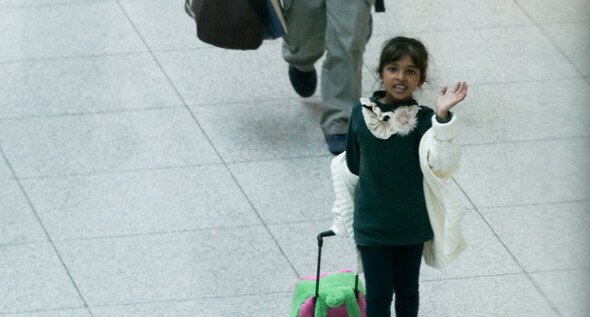
By Lee Jung-gook, staff reporter
Tears welled up in eight-year-old Mahia’s eyes. “Oh, I don’t know,” she said, dropping her head, when asked to say something to her classmates for the last time before going to Bangladesh for good.
Mahia doesn’t look Korean; she looks South Asian, but her home country is Korea. She was born in an obstetric hospital Seoul in 2005 to Phillip, 34, and Aliye, 29, both migrant workers from Bangladesh. The South Korean government does not grant citizenship to the children of foreign nationals residing in South Korea, even if they are born here, so Mahia never got valid Korean citizenship. Since her birth was never registered in Bangladesh, Mahia is not a citizen of any country.
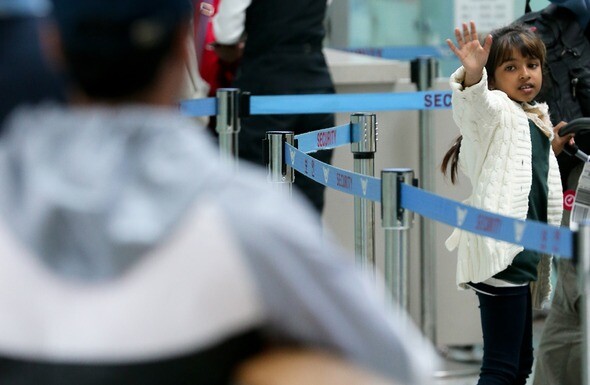
Having lived in Korea for eight years, Mahia is a typical Korean girl. Though she may not look Korean, Mahia is Korean down to her soul. She seemed reluctant to leave the country she was born in. “I don’t want to go,” she kept repeating.
She rarely eats the Bangladeshi food her parents cook for her. She hardly speaks any Bengali. Her favorite food is kimchi. “I like spicy food with hot peppers,” Mahia says. That is why half of what her parents are bringing to Bangladesh is Korean food such as red-pepper sauce, seaweed and bulgogi sauce.
“Her dad, who will remain in Korea, will have to regularly send Korean books and food to for Mahia,” Aliye said.
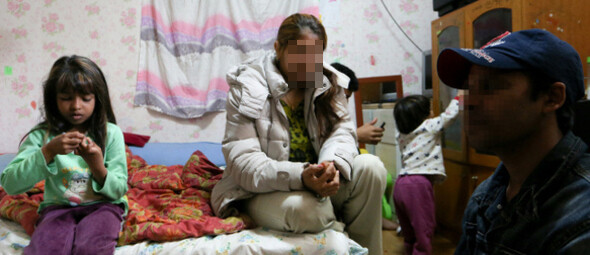
Mahia is a second grader at the Nokchon branch of Maseok Elementary School, with the help of Namyangju Service Center for Migrant Workers. Mahia’s friends in the school of just over 20 students consider her a Korean girl and were sad to have to say goodbye to her. “I’ll email often,” Mahia said, smiling. She had never considered herself Bangladeshi before. “I don’t know Bangladesh. I don’t want to leave my Korean friends. I like Korea as it is. I want to continue my studies here.”
A Korean volunteer at the migrant workers center said, “Mahia is suffering an identity crisis because society labels her as a foreigner.”
There are a number of obstacles ahead of Mahia. In order for her to receive post-elementary education for undocumented migrants, she has to rely on the good will of the school’s principal. The South Korean government frequently deports undocumented foreign workers in crackdowns.
Worried about her dark future and concerns over national identity and education, Mahia’s parents could not but decide to send her to Bangladesh.
Mahia boarded a plane to Bangladesh on May 8 with her mother and younger sister.
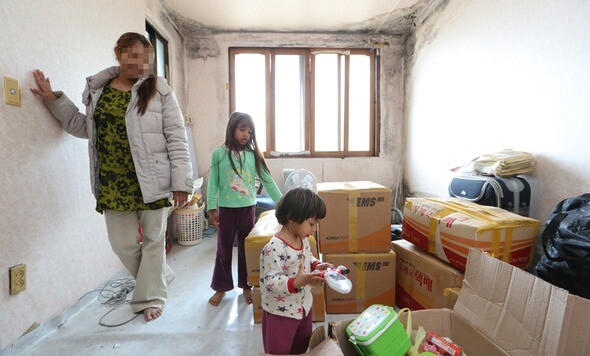
Busy preparing for the departure the next day, their faces were full of worries. Phillip, who now has to stay alone in Korea to earn money for his children, beat his chest in grief during the whole interview. “I feel heavy with worries—it’s too painful,” Phillip said. “Koreans born in the US become American - how is our daughter not Korean?” A father’s outcry resonated in the 10㎡ one-room basement unit which was covered with mold from accumulated moisture.
Mahia’s house is located in the innermost part of Maseog Furniture Complex in Namyangju, Gyeonggi Province. The basement wall of Mahia’s house, whose monthly rent is 200,000 won (US$180), whose walls are covered with mold. Mahia’s house we visited a day before their departure was even more messy with all the packing for moving.
Around 2000, when Aliye and Phillip came to Korea on three-month tourist visas, they soon became illegal aliens. Harsh crackdown in Maseok Furniture Complex was always a great threat to them. They could not do anything but watch their friends and colleagues being deported back to their countries.
Mahia’s birth was a beam of hope to them in a grim situation. She motivated them to work harder. Aliye quit her job in a furniture factory to raise her daughter. Ionpi, her second daughter, was born last year. The 1.5 million won (US$1,350) Phillip earns painting in a furniture factory is their only income.
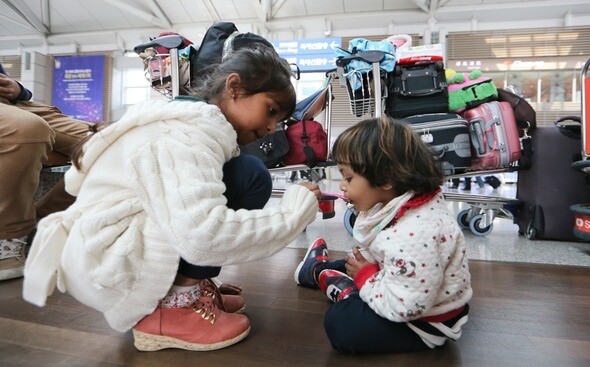
Reality swooped in on the happy family. Mahia was rejected by the Korean government when she applied to stay in the country because her parents were undocumented migrants. They weren’t able to even get a resident’s permit for Mahia.
She also doesn’t have documents for Bangladesh, her parent’s home country. Out of fear of being caught residing in the country illegally, Mahia’s parents never registered her birth with the Bangladeshi Embassy in Seoul. Mahia has all eight years of her life with no documents.
Mahia is an amiable and smart girl who has a lot of friends at school and get good grades. When asked what she likes the most, Mahia said with her eyes shining, “Studying—particularly math.” Her Korean pronunciation was even better than her parents’.
Mahia is good at piano as well. She completed the Bayer basic course and recently started learning Czerny. “We didn’t buy the music because I have to go to Bangladesh,” Aliye said as she sighed. “I’m not sure whether they teach piano in Bangladesh.”
Mahia’s passion toward studying surprises even her parents. She never missed any of her classes at school, and literally lives with her books on weekends. “There was one case when she refused to stay with her sick mother because she had to go to school,” Phillip said, looking at his daughter. “I guess that shows how passionate she is about studying.”
Mahia’s health is another worry for her parents. When she was born, she got pneumonia and had to stay in an incubator for more than a week. Her mother says that because of its hot weather, Bangladesh has far more incidents of skin diseases and pneumonia. “A migrant worker family I know returned to Korea after getting sick in Bangladesh,” Aliye said. “I am worried that Mahia might get sick.”
Worried about Mahia’s adaptation to a totally new environment, her parents decided to send her to an English school in Bangladesh. The tuition is more than triple the regular local schools. The fee is stifling to Aliye. “It is difficult for women to earn money in Bangladesh,” Phillip said, dropping his head. “Sending money I earn here in Korea seems to be the only way...”
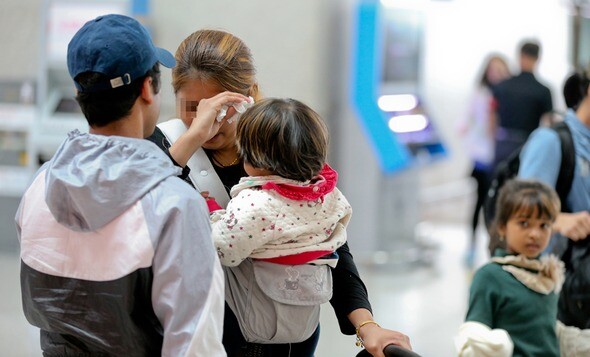
Phillip and Aliye are hoping Mahia will have a successful career as a diplomat with her skill in Korean as well as the English they now expect her to learn. Their zeal for education was not so different from that of Korean parents. The only difference is that unlike Korean parents who send their kids to developed countries for education, Phillip and Aliye have to send their daughter to a poor country like Bangladesh.
They cautiously implied disappointment in Korea. Phillip said that there used to be many migrant workers when he first moved to Maseog Complex. But with the crackdown, there are fewer than twenty remaining, and there is no interaction among them now because they avoid each other. “It doesn’t matter if they deport us, but our child has to be protected no matter what,” Aliye added. “What has the kid done? I dearly wish the law will have been changed by the time I come back from Bangladesh five years from now.”
South Korea ratified the United Nations Convention on the Rights of the Child (UNCRC) in 1991. Article 7 of the UNCRC states that every child should be registered immediately after birth, and has the right to a legal name and nationality from birth.
However, in Korea, despite having ratified the UNCRC, a survey on the conditions of undocumented migrant children still hasn’t been conducted. “Agencies estimate that there are approximately 4,000 undocumented children in the country, but there are no official statistics,” Lee Young, the Secretary General of Namyangju Service Center for Migrant Workers said. “It is shocking how Korea, even though it ratified the UNCRC, is so ignorant about these people.”
The Ministry of Justice, which is in charge of these matters, added that it is impossible to identify the actual conditions of these people, since they are undocumented migrants.
When asked what her dream is, Mahia said brightly, “I want to be a doctor—a pediatrician who cures sick children.”
When we talked on the phone with Phillip, he said, “Mahia cried a lot, saying she doesn’t want to go…” Sick at heart, he couldn’t finish his sentence.
Names of sources in this article have been changed to protect their privacyTranslated by Song Moo-bin, Hankyoreh English internPlease direct questions or comments to [english@hani.co.kr]

Editorial・opinion
![[Column] Has Korea, too, crossed the Rubicon on China? [Column] Has Korea, too, crossed the Rubicon on China?](https://flexible.img.hani.co.kr/flexible/normal/500/300/imgdb/original/2024/0419/9317135153409185.jpg) [Column] Has Korea, too, crossed the Rubicon on China?
[Column] Has Korea, too, crossed the Rubicon on China?![[Correspondent’s column] In Japan’s alliance with US, echoes of its past alliances with UK [Correspondent’s column] In Japan’s alliance with US, echoes of its past alliances with UK](https://flexible.img.hani.co.kr/flexible/normal/500/300/imgdb/original/2024/0419/2317135166563519.jpg) [Correspondent’s column] In Japan’s alliance with US, echoes of its past alliances with UK
[Correspondent’s column] In Japan’s alliance with US, echoes of its past alliances with UK- [Editorial] Does Yoon think the Korean public is wrong?
- [Editorial] As it bolsters its alliance with US, Japan must be accountable for past
- [Guest essay] Amending the Constitution is Yoon’s key to leaving office in public’s good graces
- [Editorial] 10 years on, lessons of Sewol tragedy must never be forgotten
- [Column] A death blow to Korea’s prosecutor politics
- [Correspondent’s column] The US and the end of Japanese pacifism
- [Guest essay] How Korea turned its trainee doctors into monsters
- [Guest essay] As someone who helped forge Seoul-Moscow ties, their status today troubles me
Most viewed articles
- 1[Column] The clock is ticking for Korea’s first lady
- 2After 2 months of delayed, denied medical care, Koreans worry worst may be yet to come
- 3Hong Se-hwa, voice for tolerance whose memoir of exile touched a chord, dies at 76
- 4Samsung barricades office as unionized workers strike for better conditions
- 5[Column] Has Korea, too, crossed the Rubicon on China?
- 6US overtakes China as Korea’s top export market, prompting trade sanction jitters
- 7[Editorial] As it bolsters its alliance with US, Japan must be accountable for past
- 8[Correspondent’s column] In Japan’s alliance with US, echoes of its past alliances with UK
- 9All eyes on Xiaomi after it pulls off EV that Apple couldn’t
- 10[Guest essay] How Korea turned its trainee doctors into monsters